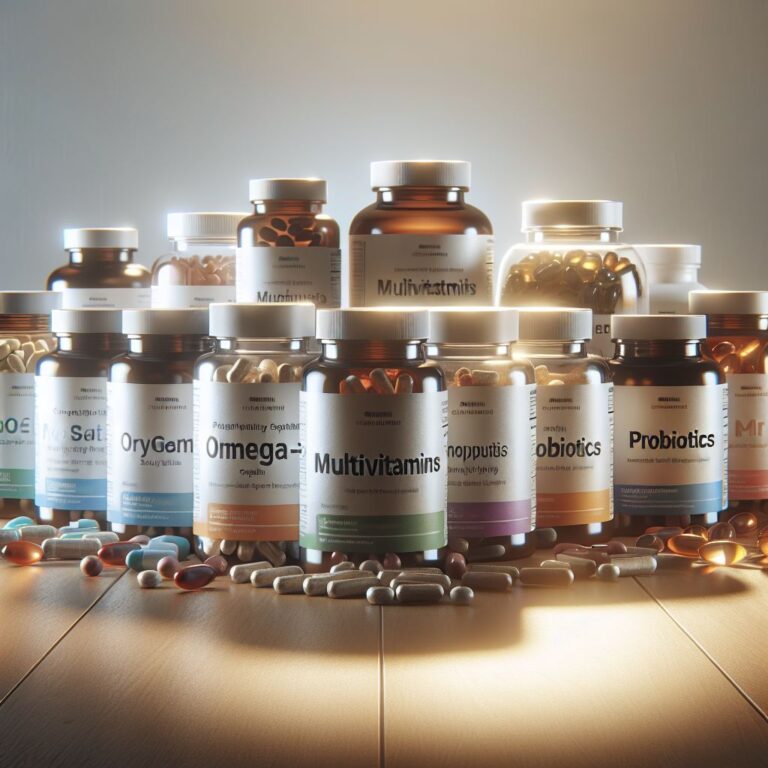Key Takeaways
- Vitamin D, crucial for regulating hormones like estrogen and progesterone, is among the essential vitamins for hormonal imbalance.
- B-Complex vitamins, particularly B6, play a significant role in managing stress and supporting hormonal health.
- Vitamin E can help alleviate symptoms of PMS and support reproductive health.
- Magnesium is a vital mineral for hormonal metabolism and can improve sleep quality.
- Dietary adjustments, lifestyle changes, and herbal remedies can complement vitamin intake for hormonal balance.
Unlock Hormonal Harmony: Vitamins and Their Impact
 Hormones are the body’s chemical messengers, and when they’re out of whack, it feels like everything else is too – but vitamins for hormonal balance can help restore harmony.. Whether it’s mood swings, weight fluctuations, or a host of other symptoms, getting hormones back in balance is a top priority for many. Good news: certain vitamins can be superheroes in this quest. Here, we’ll dive into which ones are the most effective and how to incorporate them into your daily life for optimal hormonal harmony.
Hormones are the body’s chemical messengers, and when they’re out of whack, it feels like everything else is too – but vitamins for hormonal balance can help restore harmony.. Whether it’s mood swings, weight fluctuations, or a host of other symptoms, getting hormones back in balance is a top priority for many. Good news: certain vitamins can be superheroes in this quest. Here, we’ll dive into which ones are the most effective and how to incorporate them into your daily life for optimal hormonal harmony.
The Role of Vitamins in Hormonal Balance
Think of vitamins as key players in a complex game of cellular communication. They don’t just keep you healthy; they regulate critical functions like metabolism, reproduction, and mood. Because vitamins can influence how hormones are produced and how they function, they are vital in maintaining a delicate balance. For example, some vitamins can help manage stress hormones, while others support thyroid function or the menstrual cycle. Therefore, the right mix of vitamins is essential for keeping our internal messaging system running smoothly.
Top Vitamins to Target Hormonal Imbalance
When it comes to specific vitamins for hormonal imbalance, there are a few standout nutrients that you should know about:
- Vitamin D: Often known as the sunshine vitamin, it’s a powerhouse for regulating hormones.
- B-Complex Vitamins: These are your go-to for combating stress and keeping your mood steady.
- Vitamin E: It’s not just for skin health; it can also ease menstrual-related hormonal symptoms.
- Magnesium: This mineral is a must for anyone looking to improve sleep and manage hormonal function.
These vitamins and minerals work in various ways to stabilize hormones, and we’ll explore each one in detail.
Vitamin D: Sunshine for Hormonal Health
Vitamin D has a starring role in hormonal health. It’s not just for bones; it regulates the production and activity of hormones like estrogen and progesterone. Low levels of Vitamin D have been linked to an imbalance in these hormones, which can lead to a host of issues, from menstrual irregularities to mood disturbances.
How Vitamin D Regulates Hormone Levels
Vitamin D works by entering cells and attaching to a protein called the Vitamin D receptor, located in the nucleus. This allows it to directly influence genes that regulate hormone production. For instance, it helps control the synthesis of enzymes that produce estrogen. Plus, it has a role in insulin regulation, which is tightly connected to hormonal health, particularly in conditions like polycystic ovary syndrome (PCOS).
Accessible Sources of Vitamin D
Getting enough Vitamin D is easier than you might think. Here’s how you can make sure you’re getting your daily dose:
- Spend some time in the sun. Just 10-15 minutes a day can make a difference.
- Eat Vitamin D-rich foods like fatty fish, egg yolks, and fortified products.
- Consider supplementation, especially if you live in a place with limited sunlight.
Remember, Vitamin D is fat-soluble, which means it’s best absorbed with a meal that includes fats.
B-Complex Vitamins: Stress and Hormone Management Allies
Stress is a hormone disruptor, and B-Complex vitamins are here to help. These vitamins work together to support energy production and the nervous system, ultimately aiding in the management of stress and hormone levels.
Vitamin B6 and Hormonal Regulation
Vitamin B6, in particular, is a star when it comes to hormonal regulation. It’s involved in the production of neurotransmitters, which help regulate emotions. It also plays a role in the synthesis of steroid hormones. Low levels of B6 can lead to an imbalance in estrogen and progesterone, which can throw your whole system off-kilter.
Other B Vitamins Supporting Hormone Health
But B6 isn’t the only B vitamin that’s important for hormones. Others, like B12 and folate, are crucial too. They work by helping to break down homocysteine, an amino acid that, at high levels, is associated with inflammation and hormonal imbalances. Besides that, they’re essential for energy production, which can keep stress levels in check.
Now, let’s break it down even further. Here are some ways you can get these essential B vitamins:
- Include plenty of whole grains, avocados, and nuts in your diet.
- For B12, look to animal products like meat, dairy, and eggs.
- If you’re vegetarian or vegan, consider B12 supplements or fortified foods.
And remember, while supplementation can be helpful, it’s best to get these nutrients from a varied and balanced diet whenever possible.
Alleviating PMS and Supporting Reproductive Health
Vitamin E is a bit of a multitasker when it comes to women’s health. It’s known for its antioxidant properties, but it also plays a role in alleviating symptoms of premenstrual syndrome (PMS) and supporting overall reproductive health. It can help regulate the menstrual cycle and reduce PMS symptoms like cramping and breast tenderness.
For those struggling with hormonal imbalances, Vitamin E is particularly helpful because it participates in the control of the body’s stress response. By moderating the release of stress hormones, it can indirectly influence other hormones that are linked to reproductive health. This makes it a valuable ally for those looking to ease the monthly rollercoaster ride that PMS can bring.
Best Dietary Sources of Vitamin E
To boost your Vitamin E intake, you’ll want to turn to foods like:
- Almonds, hazelnuts, and other nuts and seeds
- Spinach, Swiss chard, and other leafy greens
- Avocados, which are also a great source of healthy fats
- Fortified cereals and other products
By incorporating these foods into your diet, you can naturally increase your Vitamin E levels, which may help regulate hormone function and reduce PMS symptoms.
Magnesium: The Mineral for Hormonal Metabolism
Magnesium is the unsung hero of the mineral world when it comes to hormonal balance. It’s involved in over 300 enzymatic reactions in the body, including those that regulate the function of hormones. Many of us are running low on magnesium without even knowing it, and this can have a big impact on our hormonal health.
Magnesium’s Role in Hormone Balance and Sleep Quality
Magnesium is crucial for the production and function of hormones. It helps convert the inactive T4 thyroid hormone into the active T3 form, which is essential for metabolism and energy levels. It also plays a role in insulin sensitivity, which is important for maintaining balanced blood sugar levels—a key factor in hormonal health.
But magnesium’s benefits don’t stop there. It also has a calming effect on the nervous system, which can improve sleep quality—a vital component of hormone regulation. Poor sleep can disrupt the balance of hormones like cortisol and melatonin, so getting enough magnesium to help you sleep well is a smart move for anyone looking to improve their hormonal health.
Most importantly, magnesium can also help alleviate symptoms of PMS, much like Vitamin E. It’s been shown to improve mood and reduce water retention and bloating, making it a go-to mineral for many women.
For example, a study in the Journal of Women’s Health found that magnesium, along with Vitamin B6, can significantly reduce PMS symptoms.
With all these benefits, it’s clear that magnesium deserves a spot in your hormonal health toolkit.
Foods Rich in Magnesium
Here are some magnesium-rich foods to include in your diet:
- Pumpkin seeds, almonds, and spinach
- Black beans, chickpeas, and kidney beans
- Bananas, figs, and avocados
- Dark chocolate (in moderation)
Adding these foods to your meals can help you get the magnesium you need for hormonal balance and overall health.
Natural Treatment Solutions Beyond Vitamins
While vitamins and minerals are crucial, they’re just one piece of the puzzle. To achieve hormonal balance, it’s also important to look at your diet, lifestyle, and other natural remedies.
Dietary Adjustments for Hormonal Balance
What you eat has a direct impact on your hormones. Foods high in refined sugars and carbs can cause spikes in insulin, leading to hormonal disturbances. Instead, focus on a balanced diet that includes probiotic vitamins for digestive support.
- Lean proteins, to support hormone production
- Complex carbohydrates, for steady energy and blood sugar levels
- Healthy fats, especially omega-3 fatty acids, to reduce inflammation
These dietary adjustments can help keep your hormones in check and support overall well-being.
Lifestyle Changes That Affect Hormones
It’s not just what you eat—it’s also how you live. Stress, lack of sleep, and a sedentary lifestyle can all throw your hormones out of balance. Here’s what you can do to create a hormone-friendly lifestyle:
- Get regular exercise, which can help reduce stress and regulate hormones.
- Prioritize sleep, aiming for 7-9 hours per night to support hormone production.
- Practice stress-reduction techniques like meditation or deep breathing exercises.
These lifestyle changes can make a big difference in your hormonal health and your overall quality of life.
An example of the power of lifestyle changes is seen in the stress hormone cortisol. When you’re stressed, cortisol levels rise, which can disrupt your hormonal balance. By managing stress through techniques like yoga or meditation, you can help keep cortisol levels in check.
Besides that, remember that a healthy lifestyle is about balance, not perfection. Small, consistent changes can lead to significant improvements over time.
Herbal Remedies and Supplements
In addition to vitamins and lifestyle changes, certain herbs and supplements can also help balance hormones. Some of the most commonly used include:
- Ashwagandha, which can help reduce stress and balance cortisol levels
- Chasteberry, also known as Vitex, which may help regulate menstrual cycles
- Maca root, which is believed to help balance estrogen and progesterone levels
Before starting any herbal remedy, it’s important to consult with a healthcare professional, especially if you’re taking medications or have health concerns.
Integrating Vitamins For Hormonal Balance into Your Daily Routine
Incorporating vitamins into your daily life doesn’t have to be a chore. Start with a balanced diet, as it’s the best foundation for good health. Add a multivitamin if you’re concerned about gaps, but focus on food sources first. If you choose to supplement, consistency is key—take your vitamins at the same time each day to build a habit.
Pair fat-soluble vitamins like D and E with a meal that includes healthy fats to improve absorption. For the B vitamins and magnesium, consider taking them in the morning or afternoon, as they can provide energy. If magnesium tends to relax you, however, taking it in the evening can help improve your sleep.
Always read labels carefully and follow the recommended dosages. If you’re ever in doubt, consult a healthcare provider, especially if you have underlying health conditions or are on medication. They can offer guidance tailored to your specific needs.
Tracking Progress and When to Seek Professional Help
Keep a journal to track your progress. Note any changes in your symptoms, energy levels, and overall well-being. This record can help you identify patterns and determine if the vitamins are making a difference. If you’re not seeing improvements or if your symptoms worsen, it’s time to seek professional help.
Remember, while vitamins can support hormonal balance, they’re not a cure-all. If you’re experiencing significant hormonal issues, such as thyroid disorders, PCOS, or severe menopause symptoms, it’s important to work with a healthcare provider. They can offer comprehensive treatment plans that may include medication, lifestyle interventions, and targeted supplementation.
Frequently Asked Questions (FAQ)
When it comes to vitamins for hormonal imbalance, questions abound. Let’s address some of the most common queries to help you navigate this topic with confidence.
Can Vitamins Alone Fix Hormonal Imbalance?
Vitamins can play a significant role in supporting hormonal balance, but they’re not a standalone solution. Hormonal imbalances often arise from a combination of factors, including diet, stress, medical conditions, and lifestyle habits. While vitamins are an important component of a holistic approach, they’re most effective when combined with a healthy diet, regular exercise, stress management, and, when necessary, medical interventions.
Are There Any Side Effects to Taking Hormonal Imbalance Vitamins?
Most vitamins, when taken as directed, are safe and side effects are minimal. However, taking high doses of certain vitamins can lead to adverse effects. For example:
- Excessive Vitamin D can cause calcium buildup, leading to heart and kidney issues.
- Too much Vitamin E can increase the risk of bleeding, especially if you’re on blood-thinning medication.
- High doses of B6 can cause nerve damage.
Always stick to recommended dosages and consult with a healthcare provider before starting any new supplement regimen.
Example: A woman began taking high doses of Vitamin E to manage her PMS symptoms. After a few weeks, she noticed increased bruising and bleeding gums. When she consulted her doctor, she learned she was taking too much and adjusted her dosage accordingly.
How Long Does It Take for Vitamins to Affect Hormonal Balance?
Patience is key when it comes to vitamins and hormonal balance. It can take several weeks or even months to notice a difference. Factors like the severity of the imbalance, consistency of intake, and individual body chemistry all play a role in how quickly you’ll see changes. Give it at least two to three months of consistent vitamin intake before evaluating their effectiveness.
Which Foods Should I Eat to Naturally Improve My Hormonal Health?
To support hormonal health through diet, focus on:
- Whole foods rich in fiber, such as fruits, vegetables, and whole grains.
- Lean proteins, including fish, poultry, and legumes.
- Healthy fats, like avocados, nuts, seeds, and olive oil.
- Foods rich in antioxidants, such as berries and dark leafy greens.
- Probiotic and prebiotic foods to support gut health, like yogurt, kefir, and asparagus.
These foods provide the nutrients your body needs to produce and regulate hormones effectively.
Can Men Benefit from These Vitamins for Hormonal Imbalance?
Yes, men can also experience hormonal imbalances, and the same vitamins that help women can benefit men. Vitamins D, E, B-complex, and magnesium are just as important for men’s hormonal health. They support testosterone regulation, stress management, and overall well-being. Men should also aim for a balanced diet, regular exercise, and proper stress management to maintain hormonal health.
In conclusion, vitamins and minerals are powerful tools for maintaining hormonal balance. By understanding which nutrients support different aspects of hormonal health and integrating them into your daily routine, you can take proactive steps towards better well-being. Remember to combine these efforts with a healthy lifestyle and consult a healthcare provider when needed. With patience and consistency, you can achieve hormonal harmony and improve your quality of life.







